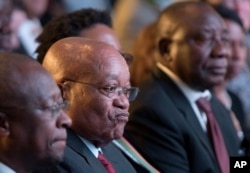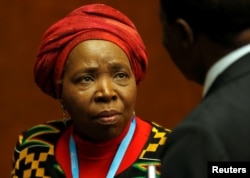In South Africa, the next presidential election is still over two years away but the possible candidates are already a hot topic of national debate after the turbulent political ups and downs of the past year.
President Jacob Zuma emerges from 2016 bruised and battered by yet another chain of corruption scandals. He survived an impeachment attempt and a string of motions for a vote of no confidence, and investigations into his conduct continue.
Although Zuma still enjoys support, some both outside and within the party are already talking about his successor as the head of the ruling African National Congress.
The ANC suffered unprecedented losses in local elections in August, losing control of several key cities. The Democratic Alliance (DA) and the Economic Freedom Fighters (EFF) cut into the ANC support base in those polls.
"There is no longer subject of doubt that Zuma’s leadership has actually destroyed the integrity of the ANC. The question now is how long will it take for the ANC to come back from this," says Independent political analyst Ralph Mathekga.
Zuma can’t run again in 2019. He will have served his two-term limit. Party rules will not allow him to remain as ANC head either.
A frontrunner to succeed him is his former wife and soon to be ex-African Union Commission chair, Nkosazana Dlamini-Zuma. She steps down from the AU post in January. Dlamini-Zuma has strong support in the party’s largest province of Kwazulu Natal. However, the opposite camp, largely dominated by the ANC’s alliance partners, wants current Deputy President Cyril Ramaphosa to take the reins.
Political analyst Karima Brown says both candidates are seen as less tainted than Zuma.
"The factions are basically stacking up. What will be interesting for me is what the combinations are of the top six and it will be interesting to see if Cyril Ramaphosa’s availability splits the Kwazulu Natal vote and how that impact the rest of the ANC structure," says Brown.
The ANC has dominated South African politics since the end of apartheid in 1994. The new party leader would still likely be the favorite in the 2019 presidential elections, but it won't be an easy ride.
"First of all, the new leader has to restore credibility of people in government. You have got to restore people’s confidence that when wrong-doing happens there will be consequences," says Mathekga. "It doesn’t mean the person has to be perfect, has got to come out with perfect policy because there is no such thing. You just need someone who is not interested in being corrupt."
Mathekga warns that a compromise candidate could emerge given the fact that Ramaphosa and Dlamini-Zuma are supported by what looks like opposing factions.
The suspense may not end any time soon. The ANC isn’t scheduled to hold the conference where it could elect a new leader until the end of 2017.














